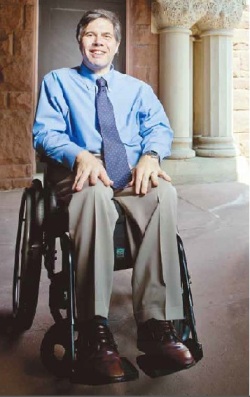I had the pleasure of interviewing visiting Professor at Harvard Michael Stein about a wide range of issues affecting people with disabilities. Professor Stein is an internationally recognized expert on disability rights, who participated in the drafting of the United Nations Convention on the Rights of Persons with Disabilities (CRPD) and actively consults with international governments on their disability laws and policies.
Below is part two of the interview. I welcome you to read part one as well.
– Ephraim Gopin
 1) How would you compare the status of people with disabilities in the US vs. Israel and I would also add US vs. Europe?
1) How would you compare the status of people with disabilities in the US vs. Israel and I would also add US vs. Europe?
US & Israel: My impression is that the US remains ahead of Israel on most fronts. Israel has some fabulous laws but it’s been very slow in enforcing them. I think the US disability civil society historically is much more advanced than that of Israel, which doesn’t take away from the accomplishments of some magnificent Israelis such as Yuval Wagner, Yoav Kreim and many others. The US has quite a number of years on Israel when it comes to including people in social participation. Of course, we have many challenges and shortcomings as well. I would love to do more work in Israel.
US vs Europe: Europe has a very sophisticated disability umbrella group, well-advanced beyond the US as far as consistently speaking with one voice. Generally, they’re able to press for particular policies in a more coherent way than the constellation of US disability groups do individually. I give a lot of credit to the European Disability Forum for pushing their agendas, such as policies on independent living. However, many EU member states do not have advanced policies. Some have yet to legislate regulations affecting public employment despite a longstanding framework directive, and there is a significant gap relative to the US regarding public accomodations.
2) “As someone with a disability (a rare illness left him in a wheelchair at 14), Stein has worked to debunk stereotypes, and his research offers innovative legal strategies and policy ideas that are regularly published in America’s prestigious law journals” (http://bit.ly/1a2Uh2g) What are some of the innovative legal strategies & policy ideas you’ve come up with?
Without getting into specifics, I can say that there isn’t a one-size-fits-all solution. When I work around the world, I try to listen and respond to the needs the local groups have identified. I bring them comparative advice and different models. It’s not my role to tell local groups what they want- it’s my role to help them think thru what might be possible, give them info, tools and models so they can decide what’s best for them. If it’s useful, I’ll present ideas on their behalf to policy makers. My duty and pleasure is to serve these local groups.
3) How many countries have you worked in? What are you educating them on?
I have worked in close to 40 countries.

Picture courtesy of: http://b.globe.com/1gDj4y6
When I work with individual governments because they’ve asked me to review their laws or policies, there are good intentions from the government and there may even be large expenditures to help people with disabilities- but perhaps they’re not doing it in the most efficient way. For example, there may be programs of the Ministry of Health but they’re not coordinating with the Ministry of Education or Ministry of Social Welfare. Or they spend lots of money on poverty reduction without understanding that a large segment of the group of those they wish to affect have a disability. Making their programs integrated as opposed to separate may make their outlays more efficient.
There are times when the government has the will to do good things but they don’t have the experience. We talk together to see how they might consider conducting their programming differently. It almost always involves bringing in local disability groups who can highlight what their priorities are and where they think the buttons and levers for change are.
4) Do you think there’s something in Judaism which propels you to want to work on disability rights? Is there a connection between Judaism and our treatment of people with disabilities?
My work on disability rights arises from my experiences as a person with a disability, but it also arises from being the child of a Holocaust survivor and to being a human rights lawyer. In all these roles, I see my mission as cultivating the recognition of beauty and value of every individual and to try to make the world a better place. To me, that is a very Jewish task.
5) Full inclusion/integration vs. separation- your take.
As a disability rights advocate, as well as a person with a disability, I am fully in favor of people with disabilities living in their own communities and cannot support segregation.
Michael Stein holds a J.D. from Harvard Law School and a Ph.D. from Cambridge University and is the Co-founder and Executive Director of the Harvard Law School Project on Disability. An internationally acclaimed expert on disability law and policy, Stein participated in the drafting of the United Nations Convention on the Rights of Persons with Disabilities, works with disabled persons organizations around the world, actively consults with international governments on their disability laws and policies, and advises a number of United Nations bodies.
Read our last post: Follow The Money
Come visit us on Facebook to learn more about inclusion of people with disabilities
